#bone density improvement
Explore tagged Tumblr posts
Text
Delicious Recipes for Improving Bone Density Naturally
Bone health is often overlooked until it becomes a problem. Many people associate strong bones solely with calcium and assume that taking supplements is the only solution. While supplements can play a role, real, lasting bone health is best achieved through a balanced diet rich in nutrients that naturally support bone density. By incorporating specific foods into your daily meals, you can enjoy…
#bone density improvement#bone health#calcium-rich recipes#healthy diet#nutrient-dense meals#vitamin D foods
0 notes
Text
Best Ways to Support Joint Health: Diet, Supplements, and Lifestyle Tips
Best Ways to Support Joint Health: Diet, Supplements, and Lifestyle Tips
Maintaining healthy joints is essential for an active and pain-free life—especially as we age. From joint mobility to bone density, the health of your joints directly affects your quality of life. If you’ve been experiencing stiffness, discomfort, or joint pain, it might be time to focus on joint and bone health with a holistic approach involving the right diet, supplements, and daily habits.
Why Supporting Joint Health Matters
Joints enable every movement, from walking and climbing stairs to lifting and stretching. When joints become inflamed or degenerate, it limits mobility and leads to chronic pain. That’s why more people are turning to healthy joint support strategies early on—not just to treat pain, but to prevent it.
1. Use of Joint Support Supplements and Tablets for Joint Pain
Modern nutrition science offers a range of joint support supplements that promote cartilage repair, reduce inflammation, and support flexibility. Common ingredients include:
Glucosamine & Chondroitin – Help rebuild cartilage
MSM (Methylsulfonylmethane) – Reduces inflammation
Collagen – Supports connective tissue health
Calcium & Vitamin D3 – Crucial to increase bone density
If you’re already feeling discomfort, tablets for joint pain can offer relief while long-term supplements improve overall joint health.
✅ Pro Tip: Always consult your healthcare provider before starting any supplement routine to ensure it fits your health goals.
2. Eat a Healthy Diet for Joint Pain Relief
The right foods can work wonders in reducing joint inflammation and pain. A healthy diet for joint pain should focus on anti-inflammatory ingredients and essential nutrients that support joint and bone health. Here are some of the best foods that reduce joint pain:
Fatty Fish (salmon, tuna) – Rich in omega-3 fatty acids
Leafy Greens (spinach, kale) – Loaded with antioxidants and calcium
Nuts and Seeds – Contain healthy fats and magnesium
Turmeric & Ginger – Natural anti-inflammatory herbs
Berries & Citrus Fruits – Packed with vitamin C for collagen production
These foods that reduce joint pain not only ease inflammation but also improve overall vitality, making them great for healthy ageing.
3. Adopt a Lifestyle that Encourages Mobility and Bone Strength
Maintaining joint mobility is key to preserving function and comfort. A few ways to stay active and keep your joints happy:
Daily stretching and light exercise to keep joints lubricated
Weight-bearing exercises like walking and light strength training to increase bone density
Practicing good posture to reduce joint strain
Staying hydrated to support joint lubrication
When combined with proper nutrition and healthy joint support, an active lifestyle can dramatically improve your long-term joint health.
4. Healthy Ageing Through Prevention and Awareness
Joint problems don’t just appear overnight—they develop slowly over time. The key to healthy ageing is being proactive. Pay attention to:
Early signs of stiffness or discomfort
Reduced flexibility
Cracking or popping sounds in joints
Trouble with everyday movements
By addressing these signs early, you can build a foundation for improve joint health before serious issues arise.
Final Thoughts
Supporting your joints isn’t just about reacting to pain—it's about prevention, awareness, and consistent care. Whether through joint support supplements, a healthy diet for joint pain, or daily movement routines, there are countless ways to invest in your joint and bone health starting today.
So, if you're wondering what's best for joints and bones, start with a blend of targeted supplements, nutrient-rich foods, and a joint-friendly lifestyle. That’s the formula for strong, flexible joints and a more active, pain-free future.
#tablets for joint pain#joint support supplements#joint mobility#healthy joints#increase bone density#healthy ageing#joint and bone health#support joint health#healthy joint support#improve joint health#reduce joint inflammation#joint health#foods that reduce joint pain#healthy diet for joint pain#best for joints and bones
0 notes
Text
#TRT Benefits#Low Testosterone#Vitality Sciences Palm Beach Gardens#Hormone Health#Testosterone Therapy for Men#Improved Libido with TRT#Increased Muscle Mass with TRT#Mood Improvement with Testosterone Therapy#Cognitive Function and TRT#Bone Density and Testosterone#Cardiovascular Health and TRT#Palm Beach County Hormone Specialists#Hormone Replacement for Men#Anti-aging Hormone Therapy#Testosterone Deficiency Treatment#Vitality Sciences TRT
0 notes
Text
The Health Benefits of Hiking: Why It’s More Than Just a Walk
Discover the amazing health benefits of hiking! We explore how this outdoor activity boosts fitness, improves mental well-being, and enhances overall health. Time to hit the trails!
Hiking is more than just a walk in nature. It’s a powerful way to boost our health. It helps our bodies and minds in many ways. It makes our hearts healthier, our muscles stronger, and our bones denser. Hiking also helps us feel better emotionally. It’s a great way to reduce stress and fight anxiety and depression. By spending time in nature, we connect deeply with the world. This connection is…
#alleviating depression symptoms#enhancing mental and emotional wellbeing#forest bathing#health benefits of hiking#hiking#improving balance and proprioception#improving bone density and joint health#lowering blood pressure and heart rate#lowering risk of heart disease and cancer#nature#reducing stress and anxiety
0 notes
Text
WHO states that osteoporosis affects around 1 in 3 women and 1 in 5 men over the age of 50. This condition weakens the Bone health making them more prone to fractures
0 notes
Text
Trusted High-Quality Kabuli Chana (White Chickpeas) Supplier in India for the Snacks Industry: Shreeji Ingredients Pvt Ltd

In the world of healthy snacks, Kabuli Chana, commonly known as White Chickpeas, has become a staple due to its rich nutritional profile and versatility. As the demand for nutritious snacks rises, so does the need for reliable suppliers who can provide top-quality ingredients. Shreeji Ingredients Pvt Ltd stands out as a trusted supplier of high-quality Kabuli Chana in India, catering specifically to the snacks industry.
The Nutritional Powerhouse: Kabuli Chana
Kabuli Chana is renowned for its impressive nutritional benefits. It is an excellent source of plant-based protein, making it an ideal ingredient for protein-rich snacks. A single serving of Kabuli Chana provides significant amounts of dietary fiber, which aids in digestion and helps maintain a feeling of fullness, crucial for weight management.
Moreover, Kabuli Chana is rich in essential vitamins and minerals such as iron, magnesium, and folate, which are vital for overall health. The low glycemic index of chickpeas makes them an excellent choice for individuals managing diabetes, as they help in maintaining stable blood sugar levels.
Versatility in the Snacks Industry
The snacks industry has embraced Kabuli Chana due to its versatility. It can be transformed into various snack forms, such as roasted chickpeas, chickpea puffs, and even as a primary ingredient in healthy snack bars. Its ability to absorb flavors well makes it a favorite among snack manufacturers looking to innovate and offer unique products to health-conscious consumers.
Why Quality Matters
When it comes to producing snacks, the quality of ingredients plays a pivotal role in the final product's taste, texture, and nutritional value. Shreeji Ingredients Pvt Ltd understands this necessity and ensures that their Kabuli Chana meets the highest standards of quality. Their commitment to excellence begins with sourcing the best chickpeas from trusted farmers who employ sustainable agricultural practices.
Rigorous Quality Control
Shreeji Ingredients Pvt Ltd employs a stringent quality control process to guarantee that only the best Kabuli Chana reaches their clients. The chickpeas undergo thorough cleaning, grading, and sorting to eliminate any impurities. Advanced machinery and technology are used to ensure uniformity in size and color, which is essential for maintaining consistency in snack production.
Furthermore, the company adheres to international food safety standards, ensuring that their products are free from contaminants and safe for consumption. This dedication to quality has earned Shreeji Ingredients Pvt Ltd a reputation as a reliable supplier in the snacks industry.
Commitment to Sustainability
In addition to providing high-quality Kabuli Chana, Shreeji Ingredients Pvt Ltd is committed to sustainability. They work closely with farmers to promote environmentally friendly farming practices that reduce the carbon footprint and conserve natural resources. By supporting sustainable agriculture, they ensure a steady supply of high-quality chickpeas while contributing to the well-being of the environment.
Customer-Centric Approach
Shreeji Ingredients Pvt Ltd places a strong emphasis on customer satisfaction. They understand the unique needs of the snacks industry and offer tailored solutions to meet these demands. Whether you require bulk quantities or customized packaging, their team is dedicated to providing exceptional service and support.
Their transparent and ethical business practices have garnered the trust of numerous clients in the snacks industry, making them a preferred supplier of Kabuli Chana.
Conclusion
As the demand for healthy and nutritious snacks continues to grow, so does the need for high-quality ingredients. Shreeji Ingredients Pvt Ltd excels in providing top-grade Kabuli Chana (White Chickpeas) to the snacks industry in India. With their unwavering commitment to quality, sustainability, and customer satisfaction, they have established themselves as a trusted partner for snack manufacturers seeking the best chickpeas for their products.
Choose Shreeji Ingredients Pvt Ltd for your Kabuli Chana needs and experience the difference that quality and dedication can make in your snack production.
________________________________________________
Tags: Anti-inflammatory benefits of chickpeas snacks, Antioxidant properties of chickpeas snacks, Are chickpeas snacks good for weight loss?, Benefits of chickpeas snacks for athletes, Benefits of roasted chickpeas as a healthy snack, Best kabuli chana (White Chickpeas) exporters in india, Best kabuli chana manufacturers & suppliers in india, Chickpeas snacks as a healthy alternative to chips, Chickpeas snacks as a source of plant-based protein, Chickpeas snacks benefits for elderly, Chickpeas snacks benefits for reducing cholesterol, Chickpeas snacks benefits for skin and hair, Chickpeas snacks for a balanced diet, Chickpeas snacks for balanced blood sugar levels, Chickpeas snacks for better cardiovascular health, Chickpeas snacks for bone density improvement, Chickpeas snacks for boosting metabolism, Chickpeas snacks for enhancing gut flora, Chickpeas snacks for enhancing mental health, Chickpeas snacks for healthier hair growth, Chickpeas snacks for healthy blood pressure, Chickpeas snacks for healthy pregnancy, Chickpeas snacks for healthy skin benefits, Chickpeas snacks for heart health, Chickpeas snacks for improving bone health, Chickpeas snacks for lowering blood sugar levels, Chickpeas snacks for managing blood sugar levels, Chickpeas snacks for managing high cholesterol, Chickpeas snacks for mental clarity and focus,
#Anti-inflammatory benefits of chickpeas snacks#Antioxidant properties of chickpeas snacks#Are chickpeas snacks good for weight loss?#Benefits of chickpeas snacks for athletes#Benefits of roasted chickpeas as a healthy snack#Best kabuli chana (White Chickpeas) exporters in india#Best kabuli chana manufacturers & suppliers in india#Chickpeas snacks as a healthy alternative to chips#Chickpeas snacks as a source of plant-based protein#Chickpeas snacks benefits for elderly#Chickpeas snacks benefits for reducing cholesterol#Chickpeas snacks benefits for skin and hair#Chickpeas snacks for a balanced diet#Chickpeas snacks for balanced blood sugar levels#Chickpeas snacks for better cardiovascular health#Chickpeas snacks for bone density improvement#Chickpeas snacks for boosting metabolism#Chickpeas snacks for enhancing gut flora#Chickpeas snacks for enhancing mental health#Chickpeas snacks for healthier hair growth#Chickpeas snacks for healthy blood pressure#Chickpeas snacks for healthy pregnancy#Chickpeas snacks for healthy skin benefits#Chickpeas snacks for heart health#Chickpeas snacks for improving bone health#Chickpeas snacks for lowering blood sugar levels#Chickpeas snacks for managing blood sugar levels#Chickpeas snacks for managing high cholesterol#Chickpeas snacks for mental clarity and focus#Chickpeas snacks for muscle recovery
0 notes
Text
Ensure Optimal Oral Health with Bone Grafting at Purple Dental
At Purple Dental, we recognize the importance of maintaining a healthy bone structure for an overall radiant smile. Our experienced dental team offers expert bone grafting procedures to restore lost bone tissue and support proper healing after various dental treatments.
Ready for a Healthier Smile? Contact Purple Dental Today!
Embark on your journey to enhanced oral health and a brighter smile with exceptional bone grafting services at Purple Dental in Glastonbury, CT. Our dedication to excellence ensures your bone health journey is a successful one, marked by resilience and stronger bones!
Unlock the Benefits of Bone Grafting
Receive outstanding dental care at Purple Dental in Glastonbury, CT, and achieve a flawless smile.
What is Bone Grafting?
Bone grafting is a specialized procedure aimed at repairing and regenerating bone tissue. This technique involves using your bone or donor bone to promote natural bone growth and healing.
Types of Bone Grafting
Bone grafting encompasses various methods, each offering unique benefits:
Autografts: Harvesting bone tissue from the patient's own body, typically the hip or ribs, to enhance the chances of successful bone fusion.
Allografts: Using bone tissue from a cadaveric donor to repair bone without the need for a second surgical site.
Xenografts: Utilizing bone tissue from animals, such as cows or pigs, to stimulate bone regeneration.
Alloplastic Grafts: Employing synthetic materials like ceramics or polymers to create a robust support system for bones.
Benefits of Bone Grafting
Enhanced Bone Healing: Accelerates the natural healing process, reducing recovery time.
Improved Bone Structure: Restores or enhances bone integrity, particularly beneficial for fractures and deformities.
Facilitates Dental Implants: Provides a stable foundation for dental implants by increasing jawbone density.
Minimized Risk of Complications: Carefully selected graft materials reduce the risk of rejection and infection.
Cosmetic Bone Enhancements: Improves facial aesthetics, offering both functional and cosmetic benefits.
Why Choose Purple Dental in Glastonbury, CT?
Comprehensive Dental Services: Offering a wide range of dental care tailored to individual needs.
Expertise and Experience: Our dedicated team possesses the highest skills and experience in handling various dental issues seamlessly.
Advanced Technology: Utilizing state-of-the-art tools and techniques for precise and effective treatment.
Personalized Care and Comfort: Ensuring patient comfort and personalized care throughout the bone grafting process.
Comprehensive Aftercare: Providing thorough aftercare for optimal recovery.
Affordable Payment Options: Ensuring reasonable and flexible payment plans.
Rebuild your oral health with professional bone grafting at Purple Dental. Schedule your consultation today and take the first step towards a healthier, more confident smile.
Purple Dental
Address: 2963 Main St, Glastonbury, CT 06033
Phone: (860) 327-6453
Website: https://purpledentalct.com/
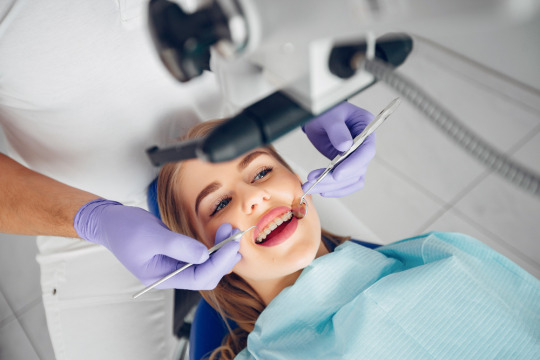
#bone grafting#Bone grafting Glastonbury CT#Dental bone grafts#Bone regeneration#Tooth extraction bone graft#Bone graft benefits#Autografts dental#Allografts dental#Xenografts dental#Alloplastic grafts dental#Bone graft aftercare#Advanced dental care Glastonbury#Bone graft oral health#Restorative dental procedures#Experienced dental team#Dental technology Glastonbury#Cosmetic bone enhancements#Jawbone density improvement
0 notes
Text
Is Castor Oil the Miracle Cure for Stronger Bones?

Are you looking for a natural way to improve bone health? Look no further than castor oil. Castor oil, recognized for its myriad benefits, may also help to preserve bone strength and health. In this article, we'll look at whether castor oil is beneficial to bones and how it may promote bone density.
0 notes
Text
Things to avoid to keep Bones Healthy
Photo by Tima Miroshnichenko on Pexels.com There are several habits that can potentially damage bone health. Here are a few examples: Sedentary Lifestyle: Lack of physical activity or prolonged periods of inactivity can weaken bones over time. Weight-bearing exercises like walking, jogging, or weightlifting are beneficial for maintaining bone density. Poor Nutrition: A diet lacking in…
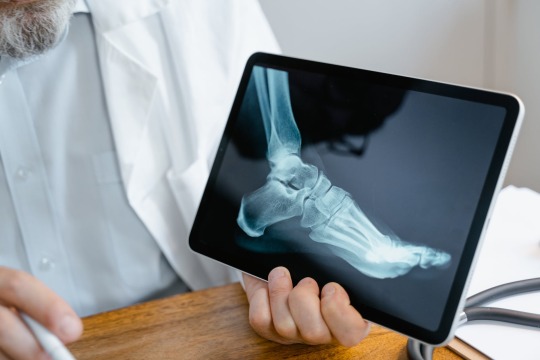
View On WordPress
#7 ways to improve bone health#bone health diet#bone health food#bone health nutrition#bone health supplements#bone health tips#foods for strong bones#foods to strengthen bones#how to improve bone health#how to increase bone strength#how to make bones stronger#how to prevent osteoporosis#increase bone density#seven ways to improve bone health#superfoods for strong bones#vitamin d3 benefits#ways to improve bone health
0 notes
Text
So. Now that she's home and safe and gonna be ok, I can talk about this.
I almost lost Kaiju. Christmas Day. I was woken up by a phone call from Allison, who will be referred to a LOT in this story. Allison runs the pet store where I board Kaiju. She called to tell me that Kaiju had lost a LOT of blood. (As it turns out, half her blood volume. Humans die when we lose 40%, just so you know. She lost 50%.)
There were no visible injuries, and she had passed a bloody stool. Or rather, a blood clot with some poop in it. She continued to pass only blood when they put her in the bathtub to clean her up. If I'd taken her anywhere else, that... would have been it, probably.
But Allison is an actual miracle worker and knew an emergency vet who was open- on Christmas Day- and could see reptiles. As soon as she called me, she took her to the e vet, where they gave her fluids and oxygen and got her stable. They did some x rays and found... nothing.
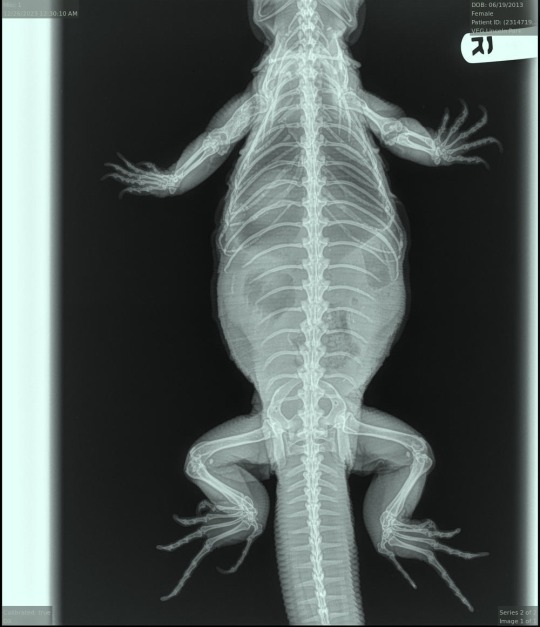
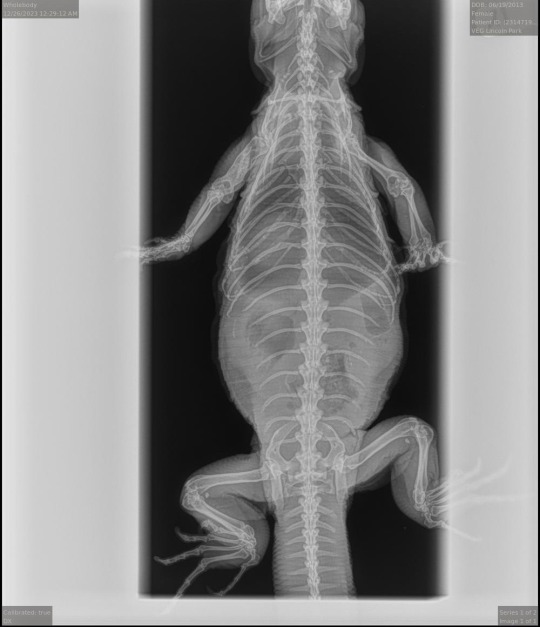
In fact, the e vet actually complimented me on her bone density and how nice her toe joints look. Whatever this mysterious haemorrhage was, it was in the soft tissue.
The immediate thoughts were:
Impaction
Cancer invading an artery
Aneurism
Reproductive issues
However, the emergency vet couldn't figure it out, and my vet was out of the country. The e vet consulted with a lot of vets and it was decided she'd go into Chicago Exotics for care the next day- they were willing to see her on immediate notice. Allison drove her over and they did an ultrasound... and couldn't differentiate the mass they found.
So, exploratory surgery it was.
But... she didn't have enough blood for that. She wouldn't have survived... if Allison hadn't found blood for her. Tegu donors were found, the transfusion happened, and was completely successful.
And what the surgery found was completely unexpected. No cancer. No repro issues. No typical impaction.
Instead? Weird white things in her muscles and a partial impaction that seems to be related to a reduction in her ability to properly digest. There are two possible diagnoses at this point. One is visceral gout. This is very strange because in reptiles, articular gout basically always happens first, and her kidneys are fine.
The other option? Weird, potentially cross species parasite she picked up when she was in the Everglades. Something she's likely had all her life, something that was dormant until recently.
I'll know when the pathology report comes back in a week or so.
Anyways! She is doing very well. She is alert and interested in things. She has an incredible appetite, even though she can't have solid food yet. She's on three meds, including one I have to inject. At her three week recheck, we will add a fourth- either the correct anti-parasitic or a medication to improve kidney function, depending on the diagnosis. Currently she's in a hospital cage and she hates it- she can't have any substrate because of the stitches.
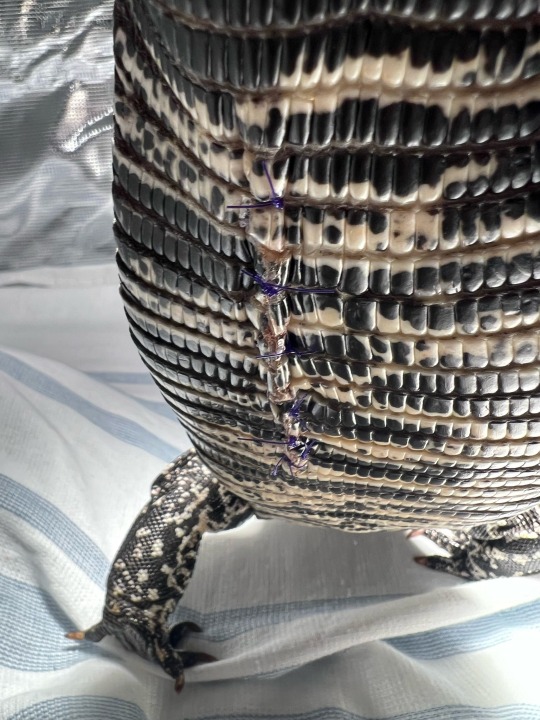
The vet says it should take about three months until she makes her full blood volume. Her pack cell count should be at 35%. It was at 7% on the 26th. But by the 28th, it was at 10%. She's gonna be ok. She's tough. My little girl is a fighter, always has been. You have to be scrappy to survive in the wild.
And throughout this entire experience, everybody has told me how lovely her personality is. Through the injections and cloacal probing and everything, she never bit or even tried to. The vet didn't think she even wanted to bite. Like it wasn't a question of wanting to bite and not being strong enough- it's just not something in her behavioural repertoire. She doesn't bite because she doesn't want to. Because even at her most scared, at her most painful, she's still Kaiju, the best tegu to ever live. Love is stored in the tegu, and it continues to be stored in the tegu. We have a long road ahead of us, but she's out of the woods and is going to be ok. We both are.
Also, consider this a MAJOR plug for Curious Creatures in Chicago. I'm never going to board my animals anywhere else.
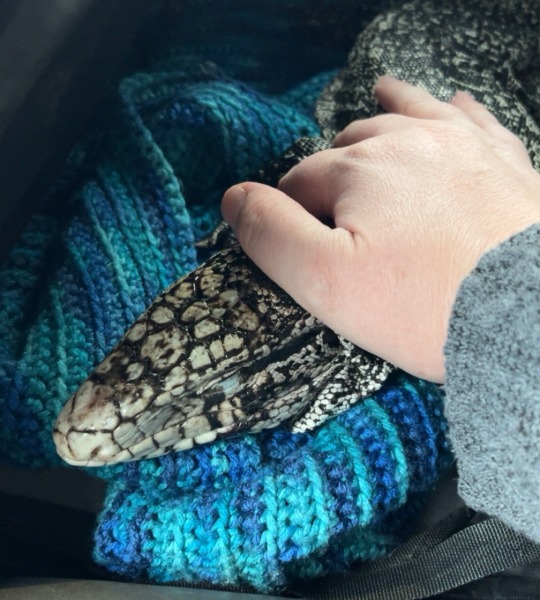
1K notes
·
View notes
Note
I’ve been listening to Pink Pony Club repeatedly. Which made me think, have you drawn Lucius as a pole dancer?
I did indeed, a few years ago!
But Tumblr-search being its usual crappy self, I can't find the post I made anymore. Which is unfortunate, because it had a very elaborate text about how beneficial poledancing is for training your strength, endurance and mobility - especially because it would be extremely hard to do for Astartes, who are way heavier for their height than humans, because of the improved bone density and black carapace.
I may have lost the post, but here's the pic: Pre-Heresy Lucius doing poledancing.


Edit: Found it! It's less elaborate than I remember. But maybe I did the textpost to this later.
#warhammer#horus heresy#emperor's children#adeptus astartes#Lucius not yet Eternal#Poledancing#pole dancing
80 notes
·
View notes
Text
DAY 6005
Jalsa, Mumbai July 27, 2024/July 28 Sat/Sun 2:37 am



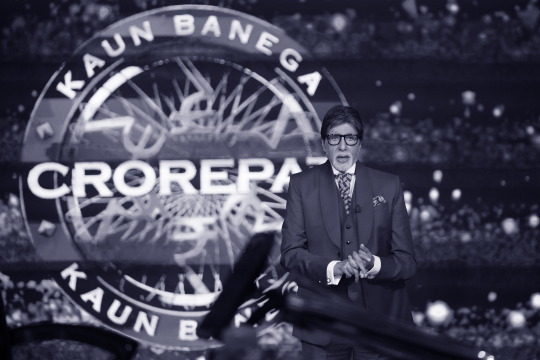
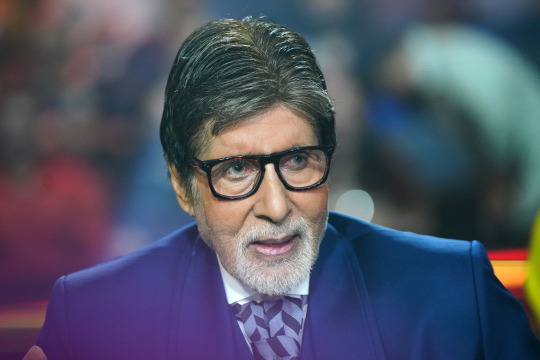






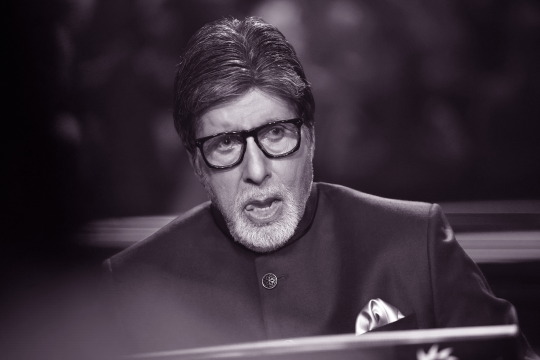


.. the body moves .. not quite as before .. but moves .. movements are an integral part of our living .. we are brought here in this Universe to move .. move out move above move about and around , but move ..
I sought the pt's of movement for us likes and are given the directions that pertain to the fact of how movement is the crucible of necessity ..
"For an 82-year-old male, maintaining movement is crucial for overall health and well-being. Gentle activities like walking, swimming, or tai chi can help enhance mobility, strength, and balance. Stretching exercises improve flexibility, reducing the risk of injury. Light resistance training can preserve muscle mass and bone density. It's essential to include regular breaks and avoid overexertion. Social activities like dancing or group exercises provide both physical and mental benefits. Consulting with a healthcare professional before starting any new exercise regimen is important to ensure safety and to tailor the activities to the individual's health status and physical capabilities."
.. and so I move ..
but enough of the 'i' .. it's time to bring in the 'they' .. 'they' are the necessity of the movement living .. for the simple reason that what 'they' induce you with , becomes the movement legacy .. 'they' may never feel so , but the fact is just that .. MOVE ..








blessed are we that are the face of public appearance .. and the 'they' comes in with immense intensity to justify our beliefs and aforementioned detail ..
when 'they' burst we explode .. when 'they' explode we hold on to their tails and travel where 'they' do or go .. 'they' go to destinations known to them but 'they' carry our destinations as well .. without them we have no destination .. our final peak is theirs .. and that is how we be ..
In a few hours from now .. well .. quite a few hours from now at the GOJ .. there shall be meets and greets and shares and givings and reciprocation .. that is life , reciprocation .. get one give two ..
and the interpretation be theirs as well .. we learn from them .. 'they' are the spirit that educates .. 'they' teach professionally .. we follow in the lead given ..
the mention of the 95% and 98% is ever adorned with great appreciation .. but 'they' teach us that there are those that achieve from the 50% to the 60% also..
are their achievements any less ..
they deserve the lead as well , to swell the encouragement to keep the growth ..
and growth is movement ..
SO ..
MOVE ..
MY LOVE CARE and my affection for them that strain .. strain to move forward .. a step or two may be and NOT a gallop .. but a step all the same ..
'take the strain .... HEAVE ' !!!!

Amitabh Bachchan
149 notes
·
View notes
Text
#TRT Benefits#Low Testosterone#Vitality Sciences Palm Beach Gardens#Hormone Health#Testosterone Therapy for Men#Improved Libido with TRT#Increased Muscle Mass with TRT#Mood Improvement with Testosterone Therapy#Cognitive Function and TRT#Bone Density and Testosterone#Cardiovascular Health and TRT#Palm Beach County Hormone Specialists#Hormone Replacement for Men#Anti-aging Hormone Therapy#Testosterone Deficiency Treatment#Vitality Sciences TRT
1 note
·
View note
Text

In 2017 I interviewed Bernadette Wren, then head of psychology at the Tavistock Gids clinic, and asked what effect puberty blocking drugs have on the adolescent brain. Looking highly uncomfortable, she replied that the evidence so far was only anecdotal but that the clinic would study its patients “well into their adult lives so that we can see”.
Even back then, before whistleblowers had exposed the rush to medically transition children, it was alarming to hear that heavy-duty GnRH agonists such as triptorelin — used to treat advanced prostate cancer and “chemically castrate” sex offenders — were being prescribed to arrest puberty in hundreds of children as young as 11.
Moreover, they were being used “off-label” before any clinical trials. And the long-term study Wren promised never materialised: Gids (the Gender Identity Development Service) routinely lost touch with patients, and the 44 it did follow reported little long-term mental health improvement.
This shocking chapter in medical history, where the ideological objectives of trans rights campaigners trumped the welfare of disturbed children, is coming to an end worldwide. The decision by NHS England effectively to ban the prescription of puberty blockers comes after the Cass review noted these drugs could “permanently disrupt” brain development, reduce bone density and lock children into a regime of cross-sex hormones requiring life-long patienthood.
NHS England unites with other national health services including those in Finland, France, Sweden and, most notably, the Netherlands — where the “Dutch protocol”, a regime of early blockers then hormones, was devised in 1998 — in pulling back from prescribing them.
Even in the United States, where a toxic combination of extreme activism and medical capitalism has pushed child gender medicine to grotesque extremes, with double mastectomies performed on 14-year-old girls, there is some retrenchment.
Leaks from the World Professional Association for Transgender Health, the body which formulates guidance on “trans healthcare”, reveal doctors perplexed at how they should explain to an 11-year-old child that drugs will render them infertile. Crucially, liberal media such as The New York Times are now reporting grave medical misgivings about child transition, once dismissed as a culture-war issue for the Republican right.
Yet the question remains: how was this ever allowed to happen? For years, puberty blockers were cheerily billed as a mere “pause button”. In 2014, Dr Polly Carmichael, the last head of Gids before the Cass review ordered its closure, went on CBBC in a show called I Am Leo, saying of blockers: “The good thing is, if you stop the injections, it’s like pressing ‘start’ and the body carries on developing as it would if you hadn’t started.”
The BBC permitted her to make this unevidenced claim to an impressionable audience of six to 12-year-olds. Imagine hearing this as a developing girl, freaked out by your new breasts and periods. No wonder Gids referrals subsequently rocketed.
Carmichael failed to mention that she did not know if pressing “restart” on puberty is always medically possible — it is not — and in fact, almost every child Gids put on blockers went on to irreversible cross-sex hormones.
After years in a Peter Pan state while their peers developed, they understandably felt there was no way back and forged on with treatment. Yet if allowed to experience natural puberty, almost 85 per cent of gender dysphoria cases resolve themselves.
Nor did Carmichael tell CBBC kids that the blockers-hormones combination, if taken early enough, not only results in sterility but kills the libido so that a young person will never experience an orgasm.
At the 2020 judicial review brought by a former Tavistock clinician and Keira Bell, the brave young detransitioner rushed onto hormones by Gids, judges expressed astonishment at Gids’s lack of an evidence base.
Reporting on this issue for seven years, I too have been struck by a complete clinical incuriosity. Not only was data not collected, but those who queried treatments or pressed for evidence faced angry condemnation. Perhaps activists knew what research might find because one long-term Finnish study, recently reported in the BMJ, destroyed the myth used to justify blockers: that a child will commit suicide if denied them.
The Finns found that “gender-affirming care” does not make a dysphoric child less suicidal. Rather, such children had the same suicide risk as others with severe psychiatric issues. In other words, changing bodies does not fix troubled minds.
Yet even after NHS England’s announcement, activists refuse to heed the now-overwhelming evidence. In its response, Stonewall persists with the myth that puberty blockers “give a young person extra time to evaluate their next steps”.
Many questions remain unanswered: will private clinics still be permitted to prescribe puberty blockers; and is Scotland’s Sandyford child gender clinic still determined to close its ears to all evidence? Plus, we have few details on how the NHS’s new “holistic” treatment for gender-questioning children will operate when it opens next month.
This repellent experiment — in which girls who like trucks or little boys who dress as princesses, and who invariably grow up to be gay, are corralled inexorably down a road towards life-changing treatments — belongs in the book of medical disgraces. As do the cheerleaders who raised money for Mermaids and those who persecuted whistleblowers or damned journalists asking questions as transphobic.
In 50 years, chemically freezing the puberty of healthy children with troubled minds will be regarded with the same horrified fascination as lobotomies — which, never forget, won the Portuguese neurologist Antonio Egas Moniz the 1949 Nobel prize.
--------------------
{Article source (behind paywall)}
242 notes
·
View notes
Note
So i want to increase my height. I'm 23 years old, female. I listened to many height subliminals. But didn’t increase 1 inch. What can i do???
So u said u didn’t increase, that’s mean that u are checking 3d instead of 4d, cause if you were reaching 4d you would see that you already have your desired height and would relax about it, remember that only your opinion and your vision of yourself matters, not others. If you are sure of this then it has already happened and it will reflect on 3d, as long as u feel it and maintain that state (that DOESNT mean u need to think about it all the time, just know that in your mind and live your life feeling what u would feel if your 3d was already align)
Here are some options that can help you if you are struggling(that’s normal, u got this):
1. Revisit Your Mindset and Belief System
Height subliminals rely heavily on belief and mental alignment. If you’re approaching them with doubt or frustration, it can create resistance. Here’s what you can do:
• Reframe your mindset: Instead of focusing on “I didn’t increase 1inch yet” shift to “My body is capable of amazing transformations.”
• Combine subliminals with visualization: Picture yourself at your desired height daily, especially before bed. Imagine standing next to others and feeling taller, looking at yourself in mirrors, and feeling confident. When you listening to the subliminal make sure to keep in mind that the subliminal ABSOLUTELY works, don't wait for it to work AFTER listening, FEEL it working while listening it.
2. Posture and Spinal Health
Poor posture can make you appear shorter. Strengthening your spine and improving posture can sometimes add a visible 1-2 inches.
• Stretching exercises: Incorporate stretches like cobra pose, cat-cow, or hanging exercises to decompress your spine.
• Yoga or Pilates: These can elongate your posture and strengthen your core, giving the illusion of added height.
3. Nutrition and Supplements (if u want to)
Optimizing your body’s nutrition can benefit your overall health and bone density.
• Calcium and Vitamin D: Essential for strong bones.
• Protein: Helps repair and strengthen tissues.
• Growth hormone boosters: Foods like eggs, fish, and nuts may support natural HGH production.
Maybe doing these more "literal" things will help you in the routine of FEELING that you are achieving the height you want, it is not necessary because the power is in your mind, but the more you can make the logical part of your mind collaborate with your subconscious, the better.
4. Persist!!!
Read some success stories, do SATS, don’t think about time, or rush. Do what makes you feel confident and certain that it is possible, that you will achieve it, and when any doubts arise or thoughts like "wtf am I doing", cut them off with the opposite thought: "YES, I can do it, even if no one else has done it, fuck it, I'll be the first, I know my power and my ability, miracles exist, circumstances don't matter and everything is possible AS LONG AS >> I << believe to." What matters is that YOU believe in it, your world revolves around you and your assumptions.
#law of assumption#loa#loa blog#loa tumblr#loass#loassumption#manifesting#neville goddard#manifestation#law of manifestation#4d reality#affirm and persist#affirmations#robotic affirming#loassblr#loass success#loass states#loablr#loassblog#sats#assume and persist#master manifestor#subliminals
56 notes
·
View notes
Text
As we age we need to think about balance, mobility and flexibility. They are all tied together. If you improve your stability, your balance will improve. If you improve your mobility (your joints), your flexibility (your muscles) will improve too 🤸🏋️

Strength and flexibility exercises will help you increase muscle strength, maintain bone density, improve balance and reduce joint pain


#positive mental attitude#positive#positive thoughts#bemindful#stay healthy#be healthy#mindfulness#health & fitness#selfcare#stay fit#balance#flexibility#strength training exercises
50 notes
·
View notes